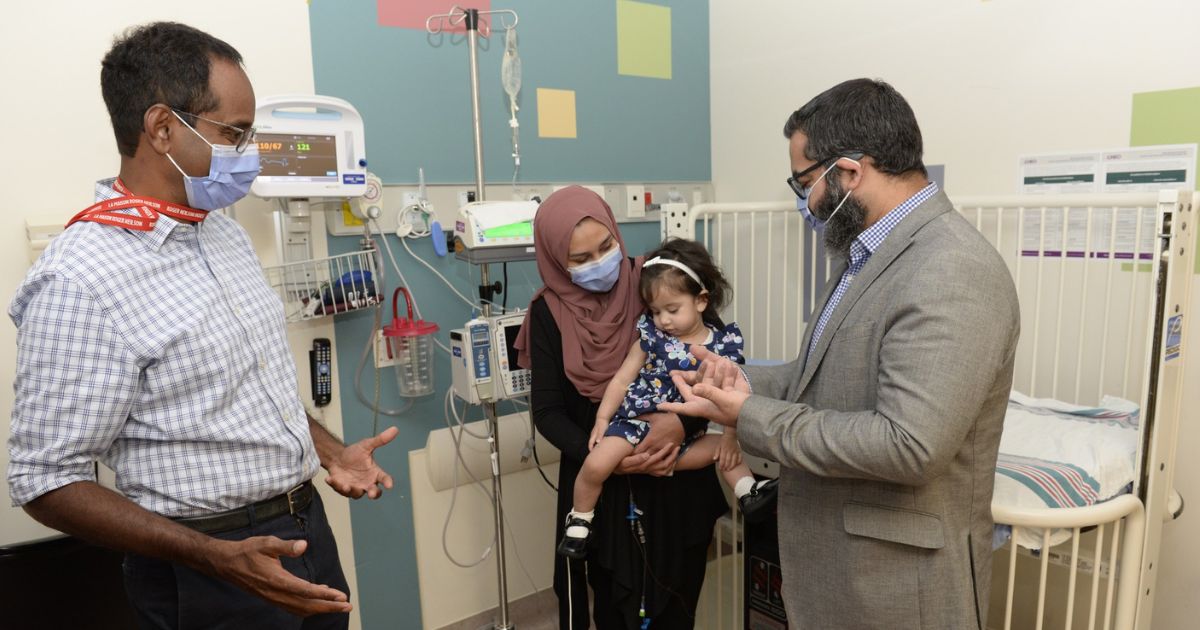Childhood diseases are a special sort of terrible, preying upon the youngest and most innocent. Parents who have walked that difficult road alongside their children have been through their own trials by fire.
But when all of a couple’s children suffer from the same rare, deadly genetic condition, it can be difficult to find hope.
[firefly_embed]
[/firefly_embed]
Sobia Qureshi and Zahid Bashir of Ottawa, Ontario, had experienced the devastating loss of daughters Zara and Sara at 2 years old and 8 months old, respectively, according to The New York Times.
The rare condition that took their daughters is known as infantile-onset Pompe’s disease and is “one of several rare lysosomal storage disorders that can severely damage major organs before birth,” according to the University of California, San Francisco.
Babies born with the disorder typically have larger hearts than usual and usually don’t make it to 2 years of age. Only 1 in every 100,000 babies born has Pompe, and though there are treatments available after birth to replace the missing enzyme that causes the disease, it’s usually too late.
[firefly_embed]
[/firefly_embed]
Sobia discovered that she was pregnant again and that her third child also had Pompe — but then came a glimmer of hope: There was an in-utero treatment available for the deadly disease.
“I found out [the therapy] was a possibility and I was kind of in shock; I couldn’t believe it,” Zahid said, according to a news release from the UCSF Department of Surgery on Nov. 9. “I only really started believing it when meetings were being set up to move it forward.”
A doctor at the university had discovered that treating the condition in-utero had a much more promising success rate, but the problem was that it was early 2020 and the Bashirs couldn’t travel from their home in Canada to UCSF because of the pandemic.
[firefly_embed]
[/firefly_embed]
Thankfully, the doctor — pediatric surgeon Tippi MacKenzie — was willing to work with others closer to the Bashirs to give their third daughter, Ayla, a real shot at life.
“We shared our treatment protocol with the doctors in Canada, and they got local approval to proceed with the treatment,” MacKenzie said. “Together with Pompe experts at Duke University, we all met by video every week to discuss care for the mother and fetus throughout the pregnancy.
[firefly_embed]
[/firefly_embed]
“The specific thing with infantile-onset Pompe is that heart disease typically starts in utero. So, with this patient, we were able to see the improvement in the lack of development of heart disease in the treated fetus, compared to a sibling who was also diagnosed before birth and who developed severe thickening of the heart muscle.”
They began the enzyme-replacement treatment, and after Ayla was born at full term, she continued — and will continue — to receive the groundbreaking therapy.
She is now 16 months old and doing very well. UCSF Benioff Children’s Hospitals shared her success story on Facebook.
“Ayla is doing great and meeting all her milestones after receiving an exciting new treatment developed at our hospital — given in the womb, before she was born!” its post read.
[firefly_embed]
[/firefly_embed]
“Due to the pandemic, Ayla’s mother couldn’t travel from Canada to our hospital to participate in a clinical trial, but UCSF’s Dr. Tippi MacKenzie shared her protocol with doctors in Ottawa, so Ayla could have the best chance of a healthy life. Thanks to the treatment, Ayla is now a happy 16-month-old toddling around and meeting all her developmental milestones!”
“Ayla is our little toddler, toddling around,” Zahid said. “We didn’t know if she’d be able to walk, to talk, to eat, to laugh.
“As she hits each of these milestones, we continue to be amazed at her progress. We are quite aware that she’s a miracle.”
This article appeared originally on The Western Journal.

























 Continue with Google
Continue with Google